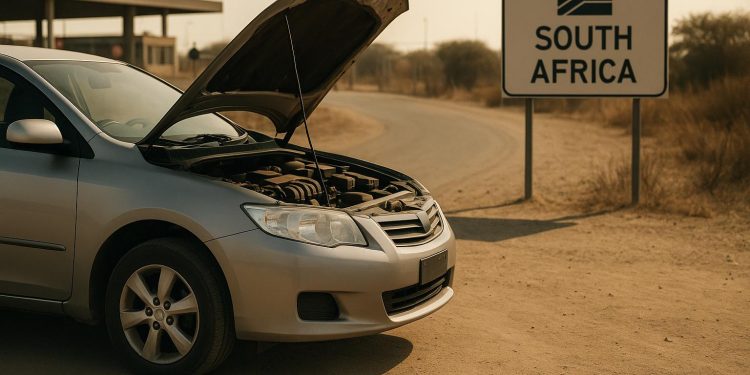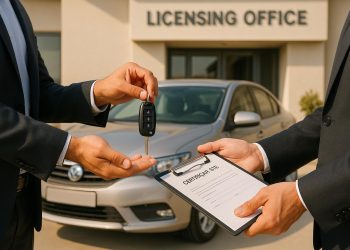South Africa’s vehicle import market can be tricky to navigate. Illegal vehicle imports are a growing problem, exposing buyers to financial losses and legal troubles. Here’s what you need to know:
- Legal imports require proper documentation, customs clearance, and adherence to safety and emission standards.
- Illegal imports often involve fraudulent paperwork, mismatched VINs, or vehicles that don’t meet regulations.
- Costs of legal imports include import duties, VAT, customs fees, and registration expenses, which can significantly increase the total cost.
- Red flags for illegal vehicles include foreign license plates, missing NaTIS certificates, and VIN mismatches.
- Penalties for illegal imports are severe. Vehicles may be seized and destroyed, and buyers lose their entire investment.
To avoid these risks, verify the vehicle’s VIN, use trusted car-buying platforms, and follow proper import procedures. Illegal imports harm not only buyers but also South Africa’s economy, with annual tax losses reaching $270–430 million. Stay informed to protect yourself and support a lawful automotive market.
KIA CEO Spotlights Illegal Car Imports in SA | The AutoBiography
South African Vehicle Import Laws
South Africa has a structured system in place to regulate the import of vehicles, ensuring they comply with customs, safety, and environmental standards. Various government agencies collaborate to oversee the process, ensuring all necessary paperwork is accurate and complete.
Laws and Government Agencies
Several government bodies are involved in managing vehicle imports. Their responsibilities range from verifying the required documentation to collecting duties and ensuring vehicles meet technical standards. This collaborative approach helps enforce strict compliance and minimizes the risk of illegal import activities.
Legal vs. Illegal Vehicle Imports
South African regulations draw a clear line between legal and illegal vehicle imports. For a vehicle to be imported legally, its documentation must be verified, including details about its history, age, and intended purpose. Certain exceptions exist, such as imports for official use, temporary purposes, or niche categories, but these must adhere to specific conditions. On the other hand, illegal imports often involve incomplete or fraudulent paperwork and misrepresented vehicle details. This makes careful verification of documentation critical to avoid unknowingly dealing with unlawfully imported vehicles.
Costs and Steps for Legal Vehicle Imports
Bringing a vehicle into South Africa legally involves several expenses and administrative procedures. Understanding these costs and steps is key to avoiding the pitfalls of illegal imports. Here’s a closer look at what to expect.
Import Duties, VAT, and Fees
When importing a vehicle, the price tag extends well beyond the purchase cost. Import duties are calculated based on the car’s declared value, engine specifications, and its country of origin. On top of that, Value Added Tax (VAT) is applied – not just on the purchase price but also on the duties themselves.
Other expenses include fees for customs clearance, port handling, required inspections, and documentation. These added costs can significantly increase the overall expense of legally importing a vehicle.
Vehicle Registration and Authentication
Once customs clearance is complete, the vehicle must be registered with the appropriate national authorities. This process requires submitting paperwork that proves the vehicle was imported legally and complies with safety and emission standards. An inspection is usually part of the process to verify the car’s identity and condition.
In some instances, further authentication steps are necessary to confirm the vehicle’s identity and prevent fraud. Additionally, buyers may need to secure a roadworthy certificate, confirming the vehicle meets safety and emission requirements. Insurance is also a must before the car can hit public roads. Keep in mind that completing registration and authentication can take several weeks.
Common Illegal Import Methods and Red Flags
When dealing with imported vehicles, it’s crucial to carefully examine all import documentation. One major warning sign is a mismatch during the VIN (Vehicle Identification Number) verification process.
Warning Signs for Buyers
Using a VIN verification service is a smart way to ensure everything checks out. Any inconsistencies in the VIN can spell trouble – both legally and financially. Always double-check that the VIN listed in the import paperwork matches the vehicle’s actual identification. This simple yet essential step can help you avoid unnecessary complications and aligns with the broader import compliance practices previously mentioned.
sbb-itb-09752ea
Penalties for Illegal Vehicle Imports
Information about penalties for illegal vehicle imports is somewhat scarce, with public sources offering limited details.
Legal Consequences and Fines
While exact figures are hard to come by, failing to comply with import regulations can lead to administrative hurdles and potential legal action. These consequences can vary depending on the severity of the violation and the governing laws in place.
Risks for Buyers
For buyers, the stakes are even higher. Purchasing a vehicle with incomplete or fraudulent documentation can result in hefty fines, legal troubles, and financial losses. Unfortunately, there’s little specific guidance available from reliable sources about the exact risks buyers may face when dealing with illegally imported vehicles.
To avoid these issues, it’s crucial to thoroughly verify all vehicle documents and import records before making a purchase. Sticking to proper import procedures not only ensures compliance with the law but also provides peace of mind during the buying process.
How to Avoid Illegal Imports When Buying Vehicles
Dodging the financial and legal headaches tied to illegal vehicle imports requires diligence and smart decision-making. By carefully verifying a vehicle’s details and sticking to reputable car-buying platforms, you can ensure your purchase complies with regulations and avoid unnecessary trouble.
Steps to Check Vehicle Legitimacy
Once you’re aware of the risks associated with illegal imports, here’s how to confirm a vehicle’s legality:
Check the Vehicle Identification Number (VIN). Every car has a unique 17-character VIN, essentially its fingerprint. Use a trusted verification service to cross-check the VIN across all available records. This step is critical to confirming the vehicle’s authenticity and history.
Using Trusted Car Buying Platforms
While verifying the VIN is crucial, choosing the right platform to buy from adds an extra layer of protection.
- Look for platforms with built-in VIN verification and thorough inspections. For instance, AUTO24.co.za offers a "VIN Verify" service, making it easy for buyers to confirm a vehicle’s legitimacy.
- Select platforms that prioritize quality checks. AUTO24.co.za goes a step further by inspecting used cars across more than 100 points, giving buyers a clear picture of the vehicle’s condition and history.
For more guidance on vehicle imports and market trends, resources like ImotoNews South Africa provide valuable information to help buyers make informed decisions.
Key Points About Illegal Vehicle Imports
Illegal vehicle imports pose serious risks to buyers and the broader automotive industry. South Africa is grappling with the presence of over 500,000 illegally imported vehicles, with around 30,000 non-compliant used cars entering the country each year, primarily from neighboring nations like Lesotho and Eswatini.
The financial impact on the South African Revenue Service (SARS) is staggering. These illegal imports result in an annual tax loss of $270 million to $430 million, a figure that has more than doubled since 2020. If these vehicles were grouped as a brand, they would rank as the third most popular "new" brand in the country.
The government maintains a firm stance against illegal imports. SARS, along with ITAC and SAPS, seizes and destroys these vehicles, regardless of whether the buyer was aware of their illegal status or willing to cover unpaid duties. In 2018, SARS destroyed illegally imported vehicles worth nearly $215,000 during a single operation. Buyers who unknowingly purchase such vehicles lose their entire investment, as there’s no way to legalize them.
Potential buyers should be vigilant for warning signs. Foreign number plates, especially from nearby countries, are a major indicator of illegal import status. Other red flags include missing NaTIS registration certificates or mismatched VINs (Vehicle Identification Numbers). These discrepancies should immediately raise suspicion.
Technology also plays a critical role in curbing illegal imports. Since 2013, all vehicles sold or manufactured in South Africa are required to have microdots – tiny markers that help trace the vehicle’s origin and prevent cloning. This added layer of security allows buyers to verify a car’s legitimacy through proper channels.
The issue extends beyond individual buyers, affecting the entire automotive ecosystem. Illegal imports disrupt the new and used car markets, weaken safety standards, and erode consumer trust. They also harm local manufacturers, threaten jobs, and hinder South Africa’s efforts to establish a competitive New Energy Vehicle sector. By adhering to import laws, consumers not only protect themselves from financial and legal risks but also support the local economy and government revenue collection. Compliance strengthens South Africa’s commitment to a secure and lawful automotive market.
FAQs
How can I check if a vehicle import is legal in South Africa?
To ensure a vehicle import is legal in South Africa, the first step is confirming that the vehicle adheres to the country’s import regulations. Make sure it has all the required paperwork, such as a valid import permit and clearance from the South African Revenue Service (SARS). It’s also crucial to verify that the vehicle meets the safety and emissions standards outlined by the National Regulator for Compulsory Specifications (NRCS).
If you’re unsure about any part of the process, it’s a good idea to consult a licensed clearing agent or reach out to the Department of Transport for assistance. Be cautious when dealing with vehicles that have unclear histories – illegally imported cars can result in serious consequences, including confiscation. Always ensure transparency and proper documentation to avoid any legal troubles.
What are the effects of illegal vehicle imports on South Africa’s economy and car industry?
Illegal vehicle imports pose a serious threat to South Africa’s economy and its automotive industry. By sidestepping legal regulations, these imports deprive the government of critical revenue from import duties and taxes. This shortfall directly affects funding for essential infrastructure projects and public services.
Beyond the economic hit, unregulated vehicles disrupt the local car market, creating unfair competition for manufacturers and dealerships. This imbalance can lead to job losses and discourage investment in the automotive sector. To safeguard the industry and support economic stability, it’s crucial to purchase vehicles through authorized and legitimate channels.
What happens if you unknowingly buy an illegally imported vehicle in South Africa?
Purchasing a vehicle that has been illegally imported – even if you’re unaware of its status – can lead to serious trouble. Authorities have the right to confiscate such vehicles without offering any compensation, which could leave you facing a significant financial loss. On top of that, you might also face legal penalties if the car doesn’t comply with import laws.
To steer clear of these risks, make sure to check the vehicle’s import documentation thoroughly. Confirm that it meets all South African regulations before committing to a purchase. If you’re uncertain, it’s a good idea to seek advice from a trusted automotive expert or a reputable dealership to ensure the car’s legal standing.
Related Blog Posts
- South Africa’s Vehicle Import Tariffs Explained
- Where to buy safe used cars in South Africa
- Avoid scams when buying used cars in SA
- Car import duties in South Africa: SARS taxes, VAT and clearance explained





